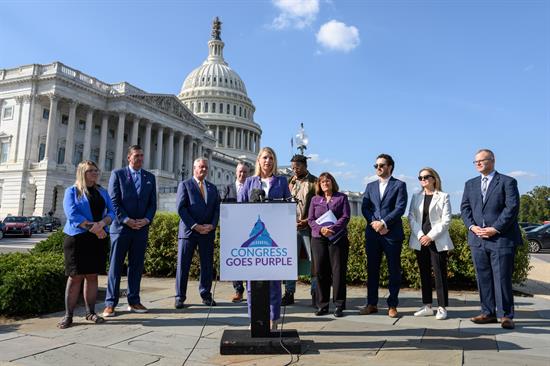Press Releases
Pettersen Joins Bipartisan Mental Health and Substance Use Disorder Task Force for Recovery Month Press Conference
Washington,
September 21, 2023
ICYMI—This week, U.S. Representative Brittany Pettersen (D-CO) joined the co-chairs of the Bipartisan Mental Health and Substance Use Disorder Task Force, Representatives David Trone (D-MD), Brian Fitzpatrick (R-PA), Annie Kuster (D-NH), and Lisa McClain (R-MI), for a press conference celebrating Recovery Month and their annual Congress Goes Purple celebration. During the event, the Task Force also unveiled its 2023 Legislative Agenda and Pettersen outlined her mother’s struggle with a decades-long substance use disorder, as well as the urgent need for Congress to take immediate action to address the opioid crisis.
Click here to access video of the press conference. Pettersen’s remarks from the press conference can be found below: — Hi everybody – it’s great to be here today to celebrate Recovery Month and all of the people who are living in recovery and thriving and had the chance to overcome their disease that is addiction – but to remember how many people are not as lucky and what we need to do to change the system. For all of you that don’t know me very well, I represent the Seventh District in Colorado, and this is an issue that is near and dear to me just like so many people that you have heard from. We have all been affected personally – whether we have gone through it ourselves, our family members, our friends, and every community across the United States has been devastated by the lack of access to treatment and recovery services. For me, it was my mom. I was six years old when my mom hurt her back. She went to the doctor and went home with bottles and bottles of opioids. After her back recovered, she ultimately found herself wildly addicted and we went from being a regular family to our childhood completely changing. My mom would do anything to avoid withdrawal. She always said she feared withdrawal more than death. And when she was eventually cut off of her prescription without access to treatment, she turned to using heroin like so many Americans. She really does fall in line with everything that has happened -- with the failures at the federal level here in the United States and every level down. She started using heroin and fentanyl started coming into the supply chain in 2016. And my mom started overdosing at a really high rate. And that is when I saw firsthand how decimated our system is and the need for comprehensive systemic change. So, in my fight to save my mom’s life when she was begging for help, saying the things I had waited my entire life to hear, finding out that there was nowhere for her to go – and it was the most helpless and hopeless feeling that I have ever had in my life. I was in a privileged position as a state representative to work with leading experts on how to navigate our terrible system and lack of access to treatment. And because I was able to get her a court order and get paid for, my mom finally got the help she needed after overdosing twenty times, three times the last day she was brought to the hospital. She finally got the help that she needed, and she just celebrated six years in recovery this August. So, I am here even though it is an emotional issue to work on with what our family has struggled with, I am here to fight for the people like my mom who are always left behind. There are so many things that we can do immediately at the federal level to bring the systemic changes that we need to support people like my mom who are desperate for help, who have a disease. We need to acknowledge that this is a medical condition and not a moral failing and we need to fund and treat it that way. I want to thank our chair and co-chairs for all of their effort, and the participants of this task force for coming together on something that is often times last on the list of priorities. This is something that should be front and center in everything we do. It has killed more people in the United States than all of the world wars combined. And I can tell you that across the United States, still one out ten people who want treatment have access to it. One out of ten. In Colorado, we have done a lot to move that forward, but it is only four out of every ten people who want help have access to that. And so, we are seeing people die every single day because of the failures to act and prioritize investments in treatment and recovery services. So, I look forward to working alongside these incredible leaders here to make sure that people across the United States are treated, who are suffering with addiction, are treated with the dignity and respect that they deserve – and that we give them the chance to also rebuild their lives and live in recovery. And with that, I get to introduce our next speaker – Harry Cunnane – who has been a fierce advocate in the recovery community and an inspiration to those who are still fighting this disease. So please join me in welcoming him. |



